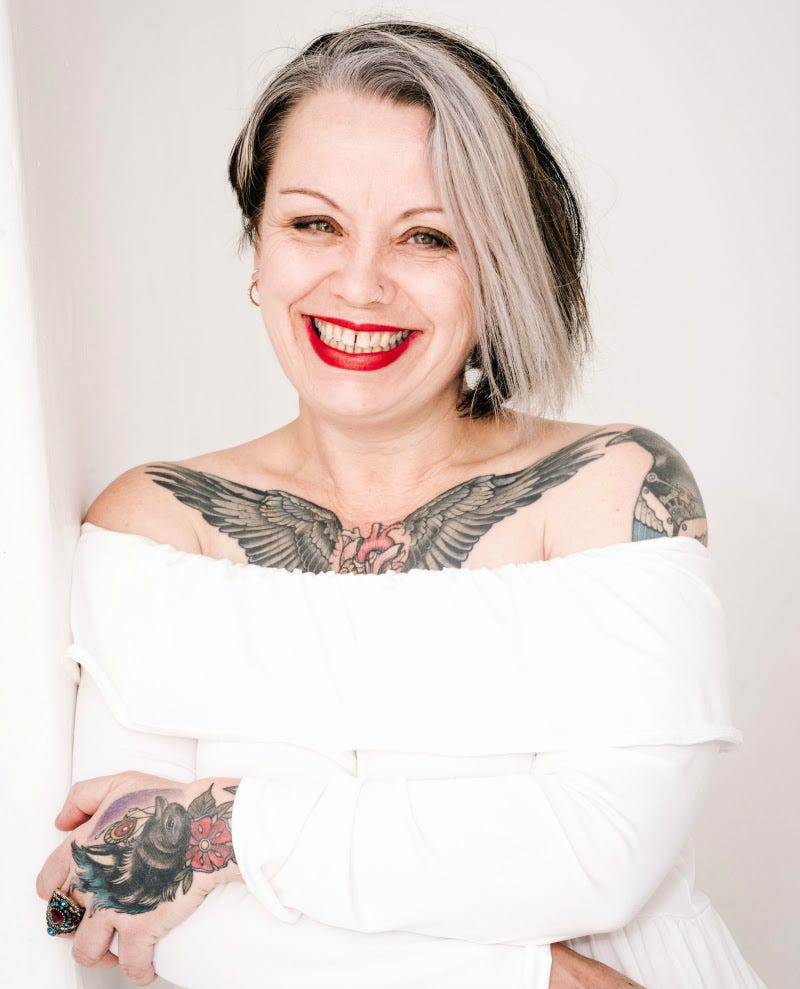"I’ve never seen a bloke slated for buying a Rolex, but woe betide a woman who boasts about splurging her bonus on Louboutins."
Authors & Money
Authors & Money is a short series of interviews with authors, inspired by author Lindsay Galvin.
I’ll be posting as usual on Mondays with an additional Thursday interview post until I run out of authors.
Violet Fenn
Author of A History of the Vampire in Popular Culture (2021), Sex and Sexuality in Victorian Britain (2020), Sex, Drugs & Proxy Rule: Secrets and Scandals in Regency Britain (Feb '22)
Why do you think women are often reluctant to talk about money?
It’s not seen as ‘ladylike’ somehow, is it? There’s been centuries of enforced reliance on men to bring in the money. And although we as a society are (hopefully) over the patronisingly sexist requirement to be ‘ladylike’, the habit has somehow stuck.
Conversely, I think it’s also sometimes down to women having fought for financial independence for so long that it’s now somehow a badge of honour to be seen as financially successful. So if we have money worries, we can end up being seen as failures in a way that men aren’t.
And don’t start me on the whole ‘shopping and prosecco’ schtick that so many media interpretations imply women fritter their cash away on! If women have spare money they can spend it on whatever they please, ffs. I’ve never seen a bloke slated for buying a Rolex, but woe betide a woman who boasts about splurging her bonus on Louboutins—and the man’s purchase would never be described as ‘frittering’ in the first place.
What is your relationship with money currently?
Stressful (there’s still too much month at the end of the money) but improving. I’m more in control and am working on plans to start bringing more in through different income streams—that way if one fails, I’ve still got backup.
A previous interviewee, Rachael Lucas, made a comment that really struck me hard—something about how having zero money had ended up being her comfort zone, so that whenever she did have money she would spend it in order to get things back to ‘normal’. I spent decades doing that! It’s only in the last four or five years that I’ve managed to keep a tiny financial safety net in case of emergencies, without having a very real urge to just get rid of it via ridiculous purchases.
Some months the safety net disappears because there’s been unexpected costs, but nowadays I’m more comfortable with a couple of hundred quid in the bank than I am without. Which probably sounds really obvious to a lot of people, but for many of us it’s a habit that has to be learned the hard way.
It would probably surprise people to know just how little I actually live on. Authors earn a lot less than the general public assumes and I’m currently very much propped up by Universal Credit. Luckily I don’t really need much from life and I don’t have expensive tastes.
You're trad published and also self-published. What's the difference been for you between the two, money-wise?
I've been lucky in that I've had (very small) advances for all of my history books at a time when no advance at all seems to be becoming the norm in nonfiction. The upfront vote of financial confidence is great, but realistically, that advance is often all that authors ever make from a book. And unless you're a big name, it isn't going to be enough to live on. Also, royalties on trad deals are tiny, however generous your contract might be overall.
With self-publishing, the stakes are higher on a personal level--financial outlay, investment of time, tech knowledge, everything. But it's balanced by the potential pay-off also being far higher than with trad. Amazon, for example, offer 70% royalties on ebooks retailing at £2.99 or above (and 60% on paperbacks), whereas trad deals usually hover somewhere around the 15-17% mark. Indie publishing is way more stressful, but it offers complete control in a way that trad never can.
Is there anything you think publishers could do to help authors financially (apart from paying more)?
Be more transparent about the payment/royalty process! I genuinely cannot fault the attitude of my own trad publishers, but even with them I've struggled to make sense of the royalty reports, especially when the books get discounted and the payment rates change.
Oh, and keep your authors in the loop! It's unbelievably frustrating to discover that release dates have changed or whatever, but no one's thought to let you know (and yes, this point is relevant to finances, because if you gee readers up to order your book on release day but then release day doesn't happen, you've immediately lost sales that you probably won't ever claw back).
I've been very lucky with my trad experiences (every last one of the people involved has been absolutely lovely) but it can definitely be hard to understand the financial side.
What’s your earliest money memory?
This is a really clear one! We always had a roast dinner on a Sunday when I was a kid (in the 1970s), but one week Mum made corned beef hash instead and I distinctly recall asking her if this meant we were poor now. I suspect she just wanted a week off from roasting stupid bloody potatoes!
What’s the biggest money mistake you’ve made?
Taking out a credit card as soon as I turned 18. I was hopeless at money-management and just ran debt up like a madwoman. I was diagnosed autistic at the age of 46—and am also suspected of having ADHD—so my disorganised attitude to finances perhaps isn’t a surprise, but of course I didn’t know any of this back then. I spent literally decades cycling between paying off debts and running up more, probably because credit has never seemed like ‘real’ money to me.
I do have credit cards again now, but there’s relatively little owing on them. And my credit rating has improved alongside my money-management skills.
What’s the best thing you’ve ever spent money on?
A Jaguar sports car. When I first started to answer this question I wrote ‘This is going to sound really silly, but…’ and then I remembered my answer to the first question. So yeah, I bought a ridiculously fast sports car AND I AM PROUD OF IT ;D
It wasn’t even a particularly luxurious purchase—ten years old and surprisingly fuel-efficient for a Jag. Plus I bought it with a tiny bit of money that was left to me when my Dad died and I knew he’d approve. I had so much fun with that car!
I only owned it for two years—I sold it during the pandemic because it wasn’t being driven enough to keep the engine healthy and was going to waste. I drive a very sensible Toyota Yaris now and it’s perfect for my needs. But I’ve certainly never regretted spending money on that Jag—I adore driving fast, luxurious cars and am not remotely ashamed of it. I’ve promised myself another sports car. One day.
What would you do with £10,000?
Weirdly, I found this the hardest question to answer! I genuinely don’t want much out of life, so long as me and my kids are okay. I don’t even like holidays very much. I’d definitely pay off my credit cards, because they’re not huge and it would be one thing less to worry about. Top up my little safety net in the bank. And then I’d buy another Jag ;D
Learn more about Violet and her books on her website, https://netherweird.net
RELATED POSTS:









Great interview. So much resonates- I’m really appreciating this series!